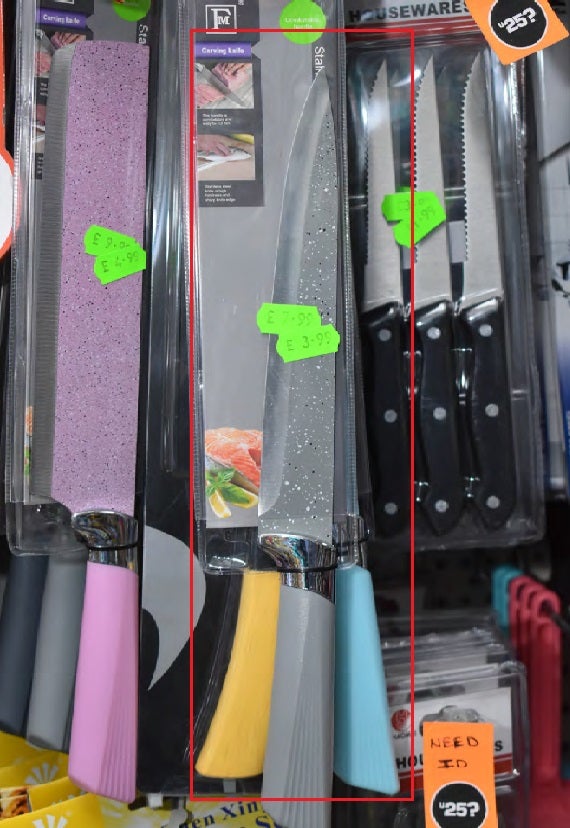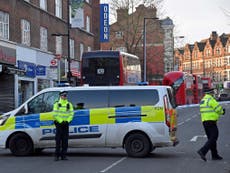Streatham terror attacker claimed he no longer supported Isis days before knife rampage
Sudesh Amman claimed terrorists were ‘pushing people away from Islam and causing hatred’

Your support helps us to tell the story
From reproductive rights to climate change to Big Tech, The Independent is on the ground when the story is developing. Whether it's investigating the financials of Elon Musk's pro-Trump PAC or producing our latest documentary, 'The A Word', which shines a light on the American women fighting for reproductive rights, we know how important it is to parse out the facts from the messaging.
At such a critical moment in US history, we need reporters on the ground. Your donation allows us to keep sending journalists to speak to both sides of the story.
The Independent is trusted by Americans across the entire political spectrum. And unlike many other quality news outlets, we choose not to lock Americans out of our reporting and analysis with paywalls. We believe quality journalism should be available to everyone, paid for by those who can afford it.
Your support makes all the difference.A terrorist who launched a knife attack after being released from prison told officials he no longer supported Isis and wanted to “become a better Muslim”, an inquest has heard.
Three days before his rampage, Sudesh Amman claimed that terrorists were “pushing people away from Islam and causing hatred”.
The 20-year-old stabbed two people on Streatham High Street before being shot dead by police on 2 February last year.
He had been under police surveillance since his release from prison 10 days earlier, and was subject to different forms of monitoring and rehabilitation efforts.
Amman was assigned two mentors as part of the Home Office’s Desistance and Disengagement Programme, because of his previous conviction for sharing Isis propaganda.
On 30 January, he told the mentor for practical issues that he was interested in work and employment opportunities.
A report by the mentor, known as Witness M because of an anonymity order, said Amman asked him about the afterlife and said he should “think about it”.
“Amman said prison had taught him that talking to people about the good of Islam was the way forward,” it added.
“He said he now realised that people who hurt other people through things like acts of terror were pushing people away from the faith and causing hatred.“
The inquest previously heard that Amman had openly voiced his wish to carry out a terror attack while in HMP Belmarsh, telling a fellow inmate on 15 January 2020: “I’m not finished with these non-believers yet.”
He associated with high-profile terrorists including the Manchester Arena bomber’s brother inside the prison, and was known to be radicalising other prisoners.
Witness M said he took Amman “at his word” about his views and said he seemed sincere and plausible.

When news of the attack reached him, the mentor said he was “shocked” and in a state of “disbelief”.
Amman was also assigned an imam as a theological mentor, because of his extremist beliefs, who met him on 29 January 2020.
Records of the meeting showed that Amman claimed he found the imam, known as Witness T, to be “inspirational”.
A report shown to the inquest on Wednesday said Amman had called himself “ignorant of Islam” and said he had mainly done “online research and self-study”.
Witness T said that when he asked the convict what he wanted to achieve, he replied: “I want to become a better Muslim and learn from the right people and keep myself on a straight path.”
The mentor said Amman appeared confident in what he was saying and looked “trustworthy”.
Asked by the counsel to the inquest, Jonathan Hough QC, whether he was aware that extremists could “con him” into thinking they were engaging with the process, Witness T said he thought he could spot such behaviour.
The mentor said he found it “hard to judge” Amman because they had only met once and was “gobsmacked” when he heard of the attack.
A probation officer who met the terrorist several times inside prison and after his release said Amman refused to talk about his views or previous offending until he showed him news articles about his 2018 court case.

Leon Campbell said Amman became “very upset” at the meeting on 27 January 2020 and claimed the reports had misrepresented his actions, and claimed that he did not support Isis although he did back Sharia law.
He told Mr Campbell that nobody should be killed over religion and “admitted that his knowledge of Islam is limited and watching Isis videos was not the best way to learn about the religion”, a meeting record said.
Asked by Mr Hough whether he was being told what he wanted to hear, Mr Campbell said he was aware of the risk.
“I did believe that there was elements of him telling me what I wanted to hear because it was difficult to challenge,” he told the inquest. “When you start challenging and drill into the things he said he would shut down again.”
Mr Campbell completed an assessment rating Khan as a “high risk of serious harm to the public” on his release, because he wanted to carry out a terror attack and could inspire others to do the same.
The probation officer said he first learned of the Streatham stabbing when Amman’s mother phoned him, crying down the phone and asking “is it him?”.
“I was in complete shock,” he added. “I didn’t expect it to happen.”
Amman was under armed 24-hour surveillance by police and MI5 when he committed the attack, with officers following metres behind him as he stole a knife from a shop on Streatham High Road and started attacking passers-by.
Mr Campbell said the terrorist had previously told him that he “believed that he would be followed” by police after his release from prison.
The inquest heard that police and MI5 considered arresting Amman two days before the attack after observing him purchase items that could be used to make a fake suicide vest.
They decided not to detain him, and did not learn that he had made the hoax device before Amman wore it during the attack.
The terrorist had pledged allegiance to Isis with a handwritten note found in his prison cell, although investigators found no evidence of a direct link to the group. The inquest continues.


